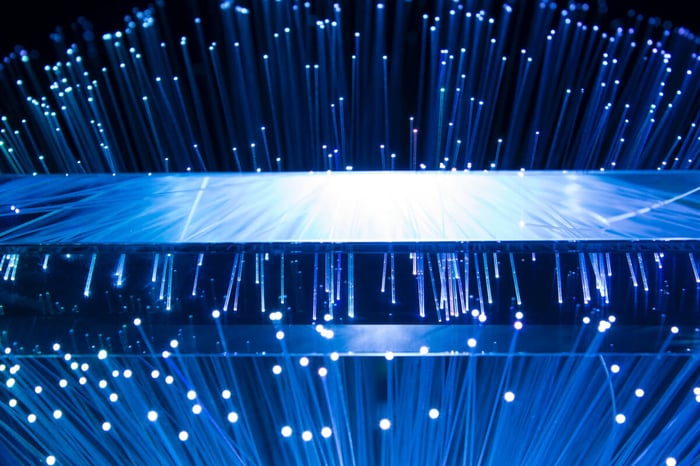Staying inside more frequently these days?
Even if you're huddled in the office all day, your skin is, unfortunately, not off the hook. Blue light, also known as high-energy visible light, damages our skin without effective care and is constantly surrounding us.
Blue light is the highest energy light that humans can physically see. It comes from the sun and electronic devices such as computers, televisions, and phones.
Blue light (also known as high-energy visible light) comes from the sun and your electronic devices' backgrounds. Physically, blue light is most similar to the sun's ultraviolet radiation, the rays which cause sunburn and skin cancer. The sun emits blue light in abundance, but with our faces glued to screens hours a day, our bodies are receiving this light at unprecedented levels. In 2018, Nielsen reported that US adults, on average, spent over nine hours a day engaging with screens. With this constant exposure, it's critical to understand what blue light does to our bodies.
There are potential benefits from blue light
Blue light can boost your attention, reaction times, and mood, which may enhance your work performance. Simply, blue light “lights” up your brain by activating brain areas with its high-energy beams.
There has been some recent research that looks at whether blue light can combat different skin conditions like psoriasis and acne. In psoriasis, phototherapy (light-therapy) can dampen the auto-immune response in the skin. This all sounds great, right?
Well, the data gathered came from brief studies conducted in a controlled lab environment, which means we still can't show conclusive evidence that blue light is a viable long-term treatment for skin conditions unless it's used alongside other medications.
Possible skin condition treatments do not tell the entire story of the relationship between blue light and skin.
Here are the downsides of Blue light exposure

Blue light can negatively impact your sleep cycle, eye health, and overall skin health.
Sleep Cycle
We all want a good night's rest. Unfortunately, blue light can continue to impact your neural circuits past when you' are ready to go to sleep. Blue light suppresses melatonin, the hormone regulating your sleep cycle. By stifling melatonin, blue light disrupts your circadian rhythm, your body’s internal clock.
Eyes
Due to its high energy, when blue light hits your eye, it can deviate from its straight path more than other colors. This phenomenon, known as scattering, can contribute to eye strain. With more of us staying at home, there is expected to be massive growth for blue light glasses to help combat this strain. The market for blue light glasses alone is expected to grow from $24 million to $38 million by 2026. We expect that as the demand for blue light protection increases, companies that emphasize and showcase their impressive results and blocking capabilities, such as Felix Gray will continue to grow in popularity. Many blue light glasses companies advertise that their product can not only fight fatigue but also prevent disease. However, most research debunks these claims because the risk of blue light causing severe conditions like macular degeneration and blindness are minuscule.
Overall Skin Health
Even worse, due to blue light, your skin experiences an overload of reactive oxygen-based chemicals through oxidative stress. This stress wreaks havoc on your collagen, the protein that makes your skin stretchy and reduces wrinkles. Sadly, by attacking the collagen through oxidative stress, “blue light contributes to skin aging similar to UVA [rays from the sun],” one study says.
Hyperpigmentation
Exposure to blue light can lead to hyperpigmentation or the darkening of the skin. Particularly in darker skin, blue light causes a complex chemical reaction that results in excess melanin production, your skin’s pigment.
Dr. Pearl Grimes is a thought leader in dermatology on pigmentary issues in all skin types, and especially in skin of color. She recently provided a new research review around the the impact of blue light on darker skin types and explains some of the challenges and impacts that blue light can have on darker skin types.
Dr. Grimes shows in her paper that the blue light can 'activate' a switch in the skin that may lead to more pigment being produced in the skin, which in turn results in photoaging — damage to the skin not caused by aging, but by exposure to sunlight and ultraviolet (UV) light. She reminds us that visible light represents 45% of the electromagnetic spectrum and every single one of us is exposed each day from computer screens, phones and tablets.
The exposure is likely a strong culprit in pigmentation issues and aging of the skin. Another one Dr. Grimes' recent studies confirms that daily use of a broad spectrum SPF 30 can reduce signs of photoaging and pigmentation challenges for darker skin types.
The Daily, by GETMr has an ultra-fine zinc oxide with test results that demonstrate a reduction in blue light exposure. We also know that formulations which use iron oxide and are tinted can provide additional protection from blue light.
Even though blue light emitted from screens is tiny compared to that from the sun, wearing an SPF product both indoors and outdoors can reduce the risk of hyperpigmentation.
Blue light on your body is a complicated subject, but we do know that the hours we spend soaking up blue light can damage your skin. Look for sunscreens that offer blue light protection as well.
Photos by Digileaders , Jacadonline, and Insider, Madison Yocum, John Adams and Soundtrap on Unsplash
Icons: Sleep Cycle, Eye Health, Overall Skin Health, and Hyperpigmentation.

